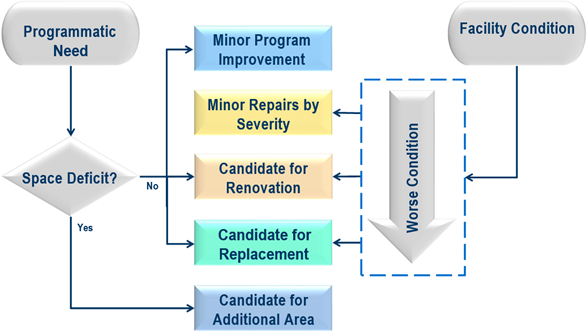ctcLink Accounting Manual | 30.50 State Funded Capital Budget Development Process
30.50 State Funded Capital Budget Development Process
2022-06-30
Each biennium the Capital Budget unit presents a capital budget development workshop outlining the process for submitting a capital budget request. RCW 28B.77.070(2)(a) requires the college system to present a prioritized list to the legislature.
Below is a brief summary of the process. For a complete discussion see the SBCTC Capital Budget Development webpage.
30.50.10 State Capital Budget Timeline
| PHASE | TIMELINE | ACTIVITY |
|---|---|---|
|
1 |
March – May 2020 |
System developed recommendations for improvement |
|
2 |
June 2020 – May 2021 |
State Board staff evaluating facility and infrastructure conditions |
|
3 |
March – December 2021 |
State Board adopted criteria for request |
|
4 |
June 2021 |
Share information in budget development workshops |
|
5 |
July – August 2021 |
Colleges develop major and minor program project proposals |
|
6 |
June – December 2021 |
Colleges submit major project proposals |
|
7 |
December 2021 |
System task force scores proposals |
|
8 |
January – February 2022 |
Colleges review minor repair and infrastructure projects |
|
9 |
February 2022 |
Colleges submit minor program project and financing requests |
|
10 |
April 2022 |
Staff build request for new and re-appropriations |
|
11 |
March – May 2022 |
State Board adopts and staff submits request |
|
12 |
May – September 2022 |
Governor’s proposal |
|
13 |
December 2022 |
Legislative proposals |
|
14 |
January – April 2023 |
Enacted budget |
|
15 |
May – June 2023 |
State Board staff and colleges implement the budget |
|
16 |
July 2023 – June 2025 |
Collected feedback on previous biennium process and outcomes |
Figure 1: Capital Budget Facility Needs Prioritization Flowchart 
Text alternative for Figure 1
Figure 1 is a graphic flow chart illustrating the prioritization of facility needs for capital budget development. Is there a demonstrable Space Deficit to meet a Programmatic Need? If yes, the project is a Candidate for Additional Area. If no, the project may be a Minor Program Improvement or a Candidate for Repair, Renovation, or Replacement, depending on facility condition rating.SBCTC surveys the condition of all college facilities that are eligible for state capital funding every two years.
This survey identifies deficiencies and prioritizes them for state funding relative to the deficiencies at all the other colleges. It also estimates the cost of the needed projects for its next biennial capital budget request.
The scope of the condition survey includes major building systems, utility distribution systems, and some site elements. It does not include dormitories, parking lots, asbestos hazard identification, ADA compliance, new construction, construction currently under warranty, or facilities recently purchased.
Major Projects receive project-specific appropriations. These funds are identified in both the system capital budget request and in the legislative appropriation act for a particular project.
In the past, major projects usually received funding over two biennia. In the future, major projects may be full funded in one biennium. See SBCTC Policy Manual 6.40.10 for additional information.
Minor Projects appropriations are for a list of projects that are similar in nature, such as program improvements, roof repair, etc.
Since priorities can change over time, the capital budget bill allows the project lists within each appropriation to be modified. The State Board is required to notify OFM and the legislative fiscal committees when we change the scope of work on a list.
The legislature intends minor projects to be completed within two years of receiving funding. See SBCTC Policy Manual 6.40.10 for additional information.
30.50.20 Locally Funded Capital Budget Development Process
Locally funded capital projects (including grants and federal funding outside the State’s capital budget) also require local capital expenditure authority so the State Board Capital Budget team can create the accounting codes and monitor the expenditures.
The State Board has delegated authority for approval of locally funded capital projects of up to $1,000,000 (SBCTC Policy Manual 1.40.20.E.) to the Executive Director. Projects costing more must be approved at a State Board meeting. See SBCTC Policy Manual 6.40.20 for additional information.
All financing for the acquisition or improvement of real property must be approved by the Legislature. See SBCTC Policy Manual 6.40.30 for additional information.
30.40 Disposition of State-Owned Real Property << 30.50 >> 30.60 Capital Project Coding